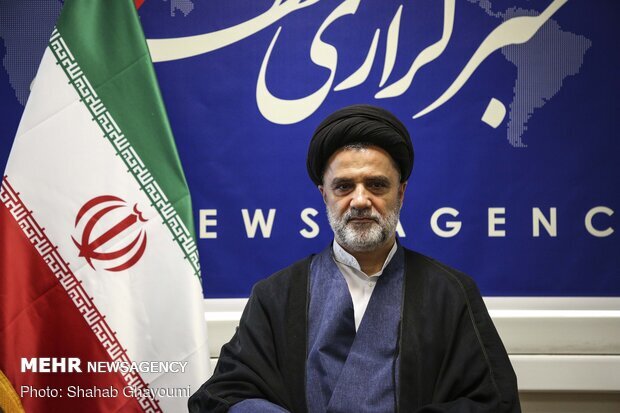Iran won’t accept oversight beyond IAEA safeguards agreements: MP

TEHRAN — The deputy chairman of the Article 90 Committee of the parliament has said Iran will not allow inspection of its nuclear activities by the Atomic Energy Agency beyond the safeguards agreement.
"The interaction between Iran and the Agency must be within the framework of safeguard, and Iran will not accept any obligation beyond safeguards agreement," Seyyed Mahmoud Nabaviyan said in an interview with Mehr news agency published on Monday.
MP Nabaviyan was reacting to the statements of some people that Iran has no choice but to accept the conditions of the West in the Joint Comprehensive Plan of Acton (JCPOA) because the economic situation depends on the agreement.
The comments by the MP comes as Iran and the remaining parties to the JCPOA, the official name for the 2015 nuclear deal, are set to resume Vienna talks in the current month with the aim of reviving of the pact.
The talks to revitalize the JCPOA began in April and continued until June 20. The talks were suspended due to transition of power in Iran resulting from the June 18 presidential elections.
"Unfortunately, the ideological basis of some people and political currents is that if we do not join hands with Western and American officials and communicate with them, we will not be able to solve our country's problems. These people consider the solution of the country's problems to be dependent on extensive relations with the Westerners and have no belief in relying on our own internal capacities and the expertise of the Iranian elite," Nabaviyan remarked.
He said: "The idea that we should contact the Westerners to solve the country's problems is completely false, because we must rely on the strength of our young forces and elites to solve the country's problems. Our nation proved during the imposed war that they can solve big problems without the help of other countries. We have also recently shown the world that we are capable of producing Coronavirus vaccines."
The imposed war refers to former Iraqi dictator Saddam Hussein’s military attack on Iran in the 1980s.
"Iran has reached nuclear self-sufficiency”
Emphasizing that the Islamic Republic has also achieved self-sufficiency in the nuclear industry, the parliamentary committee deputy chairman said that those who believe that in order to resolve the country's problems, “we should still sit at the negotiating table” and accept the conditions of the West, in the first place it is necessary to answer the question of whether the sanctions and Iran's problems were resolved with the JCPOA.
Nabaviyan noted: "Of course, the defenders of the deal say that the JCPOA was good and there have been problems since the United States withdrew from it. This is while the United States withdrew from the JCPOA in 2018, but the deal was signed in 2015, and before the withdrawal of the United States from the JCPOA, we did not see any opening, and even at that time, Iran's banking relations with many Western countries were not established."
The MP added: "The increase in sanctions on Iran is not only related to the Trump presidency, and even during the presidency of Obama; we saw the intensification of sanctions on Iran by the United States and the West. Therefore, in no way should we trust the United States and the West again, and we should not tie our country's economy to the JCPOA and the Westerners."
“They (the West) want to take missile power from Iran so that we have no means to defend ourselves in the event of an attack.”
He said everyone knows very well that with the JCPOA, sanctions on Iran were not only not lifted but increased, but despite the promise of the West, some people inside the country still believe that “we must still accept the conditions of the West.”
Through the JCPOA the Westerners sought to “weaken our nuclear industry,” and many of Iran's nuclear activities ceased, but ultimately, they did not lift sanctions on Iran, he pointed out.
The vocal MP also said one of the conditions of the Westerners is to undermine Iran’s influence in the region.
"The Westerners are looking to negotiate on regional issues and their goal is for the Islamic Republic of Iran to leave the region and is confined only within its own borders. This is while the United States has brought its military to the Persian Gulf, so we should not be confined to our own borders. The reason why the enemies cannot make Iran insecure is that we have expanded our borders and now the Iranian borders have extended to Syria, Lebanon, Yemen and Iraq."
Nabaviyan stressed that another condition by the West is to negotiate on Iran’s defensive missile program.
“They want to take missile power from Iran so that we have no means to defend ourselves in the event of an enemy attack. If we accept the Westerners' conditions for negotiating regional issues and missile issues, we have practically surrendered to the Westerners and the United States, and we should not accept these conditions.”
He added: "Our problems are not only related to sanctions, but our main problem is lack of attention to domestic production and imports. The problems of domestic producers must be solved. For example, when we can produce high quality home appliances ourselves, why is it necessary for foreign home appliances to enter our country? Improper import of foreign goods to our country must be stopped.”
Leave a Comment